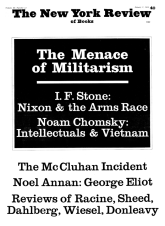In response to:
The Price Of Revolution from the June 20, 1968 issue
To the Editors:
Miss Behrens’s presentation (NYR, June 20) of Guglielmo Ferrero’s The Two French Revolutions was not only accurate but lucid and clear. The book however was not “written” by Professor Luc Monnier, one of the most outstanding of Ferrero’s disciples, who replaced him at the chair of Modern European History at the University of Geneva, but carefully edited, preserving Ferrero’s thoughts and his style and words, as can be checked through Ferrero’s original lectures preserved at Columbia University Special Collections in New York.
May I take this opportunity to recall that Ferrero’s lectures that took place every Thursday from 1931 to 1942 in the late afternoon were always an event for his students and for the non-student audience that assiduously filled the University’s aula magna. Ferrero brought to those lectures on the French Revolution his own experience under the fascist dictatorship in Italy, and every lecture was at the same time a warm protest against the growing totalitarianism in Italy and in Germany and all over Europe.
Unlike Benedetto Croce who cast his senator’s vote in favor of Mussolini after the assassination of the socialist G. Matteoti and later on though condemning the war in Abyssinia offered his senatorial bronze pin for that war when the fascisti collected metal for the war effort, Ferrero left Italy and went into exile in 1930, and thanks to Geneva University obtained a chair of Modern European History which was always refused him in his native Italy. His decision to leave Italy was motivated by his firm conviction that a revolutionary government being by its nature illegitimate must sooner or later expand into wars which like the one against Abyssinia he considered unjust and horrifying. He refused to accept Croce’s motivation that while the “fatherland” is at war one must side with it, though as Croce said, he was in principle opposed to war.
Everyone of us, then young, who heard Ferrero in those years analyzing the revolution never felt that he was an old man, the point that Miss Behrens repeats again and again. On the contrary there was in Ferrero’s argumentation and his moving voice much vigour as could not be found in many younger intellectuals in those years in Paris and in London who often justified Mussolini’s and later on Hitler’s adventures.
Bogdan Raditsa
Professor of History
Fairleigh Dickinson University
This Issue
January 2, 1969



